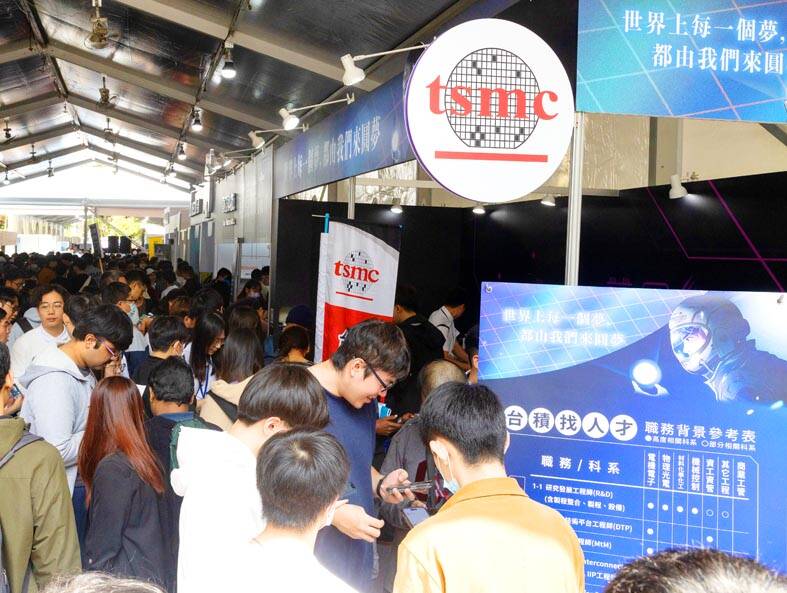Taiwan Semiconductor Manufacturing Co (TSMC, 台積電) has left its long-term gross margin target unchanged despite the government deciding on Friday to raise electricity rates.
One of the heaviest power consuming manufacturers in Taiwan, TSMC said it always respects the government’s energy policy and would continue to operate its fabs by making efforts in energy conservation.
The chipmaker said it has left a long-term goal of more than 53 percent in gross margin unchanged.

Photo: CNA
The Ministry of Economic Affairs concluded a power rate evaluation meeting on Friday, announcing electricity tariffs would go up by 11 percent on average to about NT$3.4518 per kilowatt-hour (kWh) for household and industrial users to stem massive losses for the state-owned Taiwan Power Co (台電).
For industrial users, the increases range from 7 percent to 25 percent depending on how much electricity certain industries use.
The average rise in industrial rates is 12.7 percent, pushing the average price from NT$3.38 per kWh up to about NT$3.81 per kWh, the ministry said.
TSMC is said to belong to the ultra-high voltage power user group which would see electricity bills rising 25 percent due to their consumption of more than 500 gigawatt-hours per year.
The electricity rate hike is expected to add about NT$4 billion (US$125.2 million) to TSMC’s electricity bill a year and cut its annual earnings per share by about NT$0.154, local media forecasts showed.
The chipmaker recorded a gross margin of 53 percent in the fourth quarter of last year, close to the higher end of its forecast of 51.5 to 53.5 percent, but down 1.3 percentage points from a quarter earlier because its 3-nanometer chips had not yet reached economies of scale.
The 3-nanometer process is the latest technology of which TSMC began commercial production at the end of 2022.
TSMC said it has five energy conservation task forces in place to facilitate power savings across its operations such as advanced process research and development, 12-inch and 8-inch wafer production, back-end packaging and testing services, and extreme ultraviolet (EUV) lithography equipment, which is used to produce high-end chips.
TSMC implemented massive power conservation measures in 2022 to cut power usage by 700 gigawatt-hours a year, which was equivalent to a reduction of about 360,000 tonnes in carbon dioxide emissions.
Among these measures, TSMC has optimized 12-inch wafer production equipment, which has helped the company cut electricity consumption by about 112 gigawatt-hours a year.
In addition, it has worked with its EUV supplier to cut power consumption by 22 percent from the production of each wafer made by EUV machines.
TSMC said the company is determined to fulfill its social responsibility.
The company’s operations in Taiwan account for more than 90 percent of its total revenue.

When an apartment comes up for rent in Germany’s big cities, hundreds of prospective tenants often queue down the street to view it, but the acute shortage of affordable housing is getting scant attention ahead of today’s snap general election. “Housing is one of the main problems for people, but nobody talks about it, nobody takes it seriously,” said Andreas Ibel, president of Build Europe, an association representing housing developers. Migration and the sluggish economy top the list of voters’ concerns, but analysts say housing policy fails to break through as returns on investment take time to register, making the

NOT TO WORRY: Some people are concerned funds might continue moving out of the country, but the central bank said financial account outflows are not unusual in Taiwan Taiwan’s outbound investments hit a new high last year due to investments made by contract chipmaker Taiwan Semiconductor Manufacturing Co (TSMC, 台積電) and other major manufacturers to boost global expansion, the central bank said on Thursday. The net increase in outbound investments last year reached a record US$21.05 billion, while the net increase in outbound investments by Taiwanese residents reached a record US$31.98 billion, central bank data showed. Chen Fei-wen (陳斐紋), deputy director of the central bank’s Department of Economic Research, said the increase was largely due to TSMC’s efforts to expand production in the US and Japan. Investments by Vanguard International

WARNING SHOT: The US president has threatened to impose 25 percent tariffs on all imported vehicles, and similar or higher duties on pharmaceuticals and semiconductors US President Donald Trump on Wednesday suggested that a trade deal with China was “possible” — a key target in the US leader’s tariffs policy. The US in 2020 had already agreed to “a great trade deal with China” and a new deal was “possible,” Trump said. Trump said he expected Chinese President Xi Jinping (習近平) to visit the US, without giving a timeline for his trip. Trump also said that he was talking to China about TikTok, as the US seeks to broker a sale of the popular app owned by Chinese firm ByteDance Ltd (字節跳動). Trump last week said that he had

STRUGGLING TO SURVIVE: The group is proposing a consortium of investors, with Tesla as the largest backer, and possibly a minority investment by Hon Hai Precision Nissan Motor Co shares jumped after the Financial Times reported that a high-level Japanese group has drawn up plans to seek investment from Elon Musk’s Tesla Inc to aid the struggling automaker. The group believes the electric vehicle (EV) maker is interested in acquiring Nissan’s plants in the US, the newspaper reported, citing people it did not identify. The proposal envisions a consortium of investors, with Tesla as the largest backer, but also includes the possibility of a minority investment by Hon Hai Precision Industry Co (鴻海精密) to prevent a full takeover by the Apple supplier, the report said. The group is